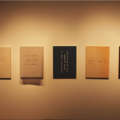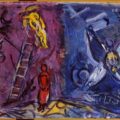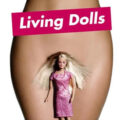Virginia Woolf for FCC Chair!

If she were alive today, Virginia Woolf would be celebrating her 138th birthday this year. An inspiration to millions of writers around the world, Woolf’s mordant social criticism lends fuel to contemporary activist movements as well. Best-known for Mrs. Dalloway (1925)—think Nicole Kidman with a prosthetic nose in Stephen Daldry’s 2002 adaptation, The Hours—and A Room of One’s Own (1929), Woolf is now a respected member of the literary canon. But, later in her life, she became even more outspoken about the contemporary mores that restricted women and kept the powerful in power. In particular, her critique of media concentration, slyly embedded in her anti-war treatise, Three Guineas (1938), is highly relevant today.
In the wake of a Presidential transition, will which also usher in changes at the Federal Communications Commission, we ought to reflect on the issues of gender, media and power that Woolf raised eighty-two years ago.
Woolf wrote Three Guineas when she was 56. I read the book just before turning 50. As a graduate of a former woman’s college, granddaughter of a librarian and all-around self-described bibliophile, it is hard to believe I never read it before now. It is not just disbelief I feel, but pure, unadulterated embarrassment. Her essay is probably the most powerful and well-written feminist critique of society that I have encountered in my life. If that sounds like hyperbole, it isn’t. Woolf’s text is creative, funny, insightful and scathing. It is full of her imaginative touches, hypothetical situations conjured out of thin air to prove a point and pointed references to society folks from a bygone era—which require the reader to get up off her ass and do some research. My Vassar professors would be proud, when they were done being scandalized that I never read it before (did I already mention that?). I urge those of you who have not read it to read it this year or next in honor of the 100th anniversary of the passage of the 19th amendment. Although this congressional legislation gave women the right to vote, we have not yet achieved full equality. Not even close, and Woolf’s essay will astound you with its continued relevance over eighty years after its initial publication.
An essay whose subject (at least on the surface) is how women can prevent war, Woolf sprinkles it liberally with critical commentary on gender roles and inequality. It came as no surprise to me that Three Guineas was blasted when it came out—mostly by the Oxford elite, the male dons who scorned Woolf’s tone—insert here all the derogatory terms for an angry woman you can think of . . . the list will be long, and not surprisingly none of these words could be used against Ernest Hemingway or Tom Wolfe (or Mark Zuckerberg or Jeff Bezos for that matter). But, to the ascot-bedecked literary gentlemen and their contemporary counterparts I say: yes, she is angry, but can you blame her?
This is exactly how I respond to my students, college-aged women and men who chafe against the cantankerous tone of the feminist writers we study. I try my best to explain: Think about it, I say, you were considered the property of a man, first of your father and then your husband; you had no freedom to move about in the world; you were confined to your house, your days taken up with cooking, cleaning, and child care; you rarely spoke to another adult person in the course of a day, except maybe the butcher or baker (oh, the stimulating exchanges to be had concerning mutton roasts and yeast rolls). This was the life you were living. Crushing rules, regulations and expectations, and what’s more, you were not even allowed to express an opinion about it. So, yes, I’d say there was some cause for anger, even resentment and rage. (Have I gone too far?)
Teaching at a former women’s college is a mixed blessing for these conversations—most of the students I teach understand and respect the history of the women’s college in America, but since we were forced to go co-ed twelve years ago, the equity issue can get muddled. Still, I insist on highlighting the facts, such as the fact that women still make less than men (the exact difference is difficult to pin down and dependent on other factors such as race, but it cannot be denied). Virginia Woolf was highly attuned to this discrepancy in 1938 and mordantly insightful about the cluster of other factors that went along with financial disparity. That the Oxford dons did not want to hear about, think about or even admit society’s ill treatment of women is not totally surprising—it is probably to be expected at that time and place.
That men were still denouncing Three Guineas in 2002 America is a bit of a shocker. Theodore Dalrymple, former physician and Senior Fellow at the conservative think-tank, The Manhattan Institute, gives himself away as a modern-day F. R. Leavis when he writes in that organization’s publication, City Journal, that Three Guineas is “a locus classicus of self-pity and victimhood as a genre in itself.” Later in his commentary, searching for a reason to explain Woolf’s criticism of society, he offers her “alleged” sexual abuse at the hands of her brothers, and even more stunning, he confesses that he finds the thought of Woolf forced to walk the streets of London as a prostitute, “irresistibly funny.” Funny, Theo? Dalrymple’s self-satisfied and tone-deaf dismissal of Woolf’s observations is just another example of the oblivious (and mostly testosterone-y) attitudes that incite the ire of feminist writers. This kind of outright misogyny is no longer acceptable, if it ever was.
What I love, love, love (and what her male critics could not appreciate) about Three Guineas is that Woolf expresses her rage and resentment in the guise of a polite treatise that purports to determine upon whom she ought to bestow her charity (like a debutante poised to fill out her dance card at a ball). Could there be anything more ladylike than offering charitable alms? Why, charity is the lifelong partner of faith and hope. Come to think of it, these related virtues are present in the text as well, though perhaps not as explicitly invoked.
In publishing her epistle, Woolf no doubt hoped that readers would grasp her intended message and take it to heart. She had faith in the literary establishment and the reputation she had built during her 20-year long career. Perhaps she didn’t anticipate the vehemence with which her work was met. But, on the other hand, perhaps she did, and this is why she published it at 56. By then she had an established literary ethos and what’s more, she was over 50, so womanly propriety was officially out the window. A menopausal woman is a powerful force.
I was inspired to read Three Guineas by Carolyn Heilbrun’s book, Writing a Woman’s Life (1988). I first encountered Heilbrun’s book in graduate school when I was 23 or 24—less than half my age now. Barely even considering myself a woman at that time, I connected with her essays in only the most superficial way. I was reading it in the context of a writing course, so I searched for words of wisdom about mining one’s life for one’s work. In fact, I don’t even remember reading the chapter on late-career women writers. What did I know of 50? How could I relate to the women she discussed who had lived through marriages, families, careers, deaths and menopause? All I had lived through was growing up in a college town, going to high school in the South, and spending four years at an elite liberal arts college, none of which could compare.
But now I can relate. Having the benefit of life experiences similar to her subjects, and, embracing a journey to reinvent myself as a writer, I can appreciate Heilbrun’s praise of Woolf and Colette, among others. In particular, I was moved by the Dorothy Sayers quote she uses to open the chapter: “Time and trouble will tame an advanced young woman, but an advanced old woman is uncontrollable by any earthly force”. To re-cast aging as powerful is delicious, especially the idea that as women age, they are relieved from the need to perform “woman” and all the expectations accruing to that role. As Gloria Steinem remarked, “we are all trained to be female impersonators.”
So, reading Three Guineas as a woman on the verge of 50 was an act of pure inspiration and empowerment. Reading it as a college professor of media and communication also has its advantages. I am able to see what Woolf was trying to do as a polemic. With its meticulously-argued claims and highly structured framework, Three Guineas presents itself as a philosophical treatise, perhaps as a pacifist manifesto. As I was reading it I kept thinking about the work of the Greek philosophers, Plato’s Phaedrus, for instance, in which Socrates uses all the tools of rhetoric to initially denigrate this very art. But, after posing rhetorical questions, dividing and defining, listing the pros and cons, conjuring up fantastical stories, anticipating the opposition and reiterating his strategies, Plato reaches the conclusion that rhetoric is like love: it is the love of discourse. Phaedrus is the quintessential primer for those who want to study the art of persuasion and Woolf seems to have taken cues from Plato and his fellow Greek scholars.
Woolf examines each of her three possible charitable beneficiaries, reasoning through the pros and cons of donating to them. In what seem at first like digressions, she eloquently establishes the merits of paying women for their work (so they can hold and offer their own opinions: “freedom from unreal loyalties”), the value of reading multiple newspapers (because money drives what each one prints: “the admixture of baser ingredients”), and the power of women united in a shared goal (refusing to attend church, say, until war is denounced from the pulpit, “empty churches at Oxford”).
Scandalously even today, she argues for women to be paid not only for their work outside the home, but for their work as caretakers, wives and mothers. She supports this suggestion by noting that such a strategy would no doubt encourage more women to take up these positions—which was urgently needed in a time of falling birth rates. Other astute observations include her comment that women are part of the “ignorantsia,” the opposite of the “intelligentsia.” What a great word. It should be used more often (though not in reference to women).
Despite her attacks launched across the bow of society, Woolf is nothing if not a product of it. Most notably is her tendency to name drop. A list of women from the Bible and various Greek myths is thrown out with little explanation, as is a story about Mr. Jex-Blake and his daughter. Thinking at first that this was a delightfully clever made-up name, Google showed me the error of my ways. Jex-Blake’s daughter was Sophia, an actual person, who was a pioneering feminist, one of seven women to attend medical school in Edinburgh in 1869. Thank you, Virginia, for introducing me to the Edinburgh Seven and the Surgeon’s Hall Riot—what great fodder for a poem.
Woolf celebrates a wide variety of women in Three Guineas, women who are more or less famous than Sophia Jex-Blake, for example, Mrs. Kathleen Rance, Mayoress of Woolwich, who speaking before a crowd at a bazaar five days before Christmas in 1937, refused to join the knitting effort to support the war. The brilliance of this act, and of its brave actor has captured my imagination over eighty years later. A woman in a leadership position, standing before her constituents, basically turning her back on both women’s work AND patriotism in one fell swoop … it’s a wonder she was not run out of that town.
With these anecdotes and her pointed name-dropping, Woolf’s writing can feel dated at times, but in other instances, she is so before her time it is uncanny. In a passage about the “daughter of an educated man” who takes three daily newspapers, she calls out the whole corrupt media industry. Incidentally, the “daughter of an educated man” is the closest thing to a protagonist we get in Three Guineas, pointedly known only as the offspring of a man and not described as educated herself, because that adjective and all it entails was denied to women of Woolf’s time.
Woolf asks her fictional character why she takes three dailies, and the young woman replies:
You call yourself an educated man’s daughter, and yet you pretend not to know the facts—roughly that each paper is financed by a board; that each board has a policy; that each board employs writers to expound that policy, and if the writers do not agree with that policy, the writers, as you may remember after a moment’s reflection, find themselves unemployed in the street. Therefore if you want to know any facts about politics, you must read at least three different papers, compare at last three different versions of the same fact, and come in the end to your own conclusion.
She goes on to write:
The literature of fact and the literature of opinion, to make a crude distinction, are not pure fact, or pure opinion, but adulterated fact and adulterated opinion, that is fact and opinion ‘adulterated by the admixture of baser ingredients,’ as the dictionary has it. In other words, you have to strip each statement of its money motive, of its power motive, of its advertisement motive, of its publicity motive, of its vanity motive, let alone all the other motives which, as an educated man’s daughter, are familiar to you, before you make up your mind about which fact about politics to believe.
Woolf’s prescience here in calling attention to the money and power which drive media coverage is surprising for 1938 and for an essay about women’s role in preventing war. Her observations no doubt fueled the fire of her detractors, many of whom ran in the same circles as the newspaper publishers. These very same words could be spoken today, particularly in light of the 2019 Disney-Fox merger, which shrunk the already diminutive mediascape, and Facebook’s purchase of both Instagram and What’sApp. What would she have said at the sight of the top four digital media executives (all male) testifying remotely before the House Subcommittee on Antitrust last July? The public debate at least called attention to the concentration of power in the hands of a few and as we have seen all too vividly, this power has actual real-life ramifications.
If Woolf were alive today, no doubt she’d have a lot to say about the role of the media and its connection to truth, lies, and power. In the past six years, these issues have sparked national conversations about “fake news” and the value of professional journalism. As media consolidation proceeds unchecked, money and power continue to take precedence over issues like net neutrality and bridging the digital divide. The pandemic has vividly highlighted technological inequalities, creating what acting chair of the Federal Communications Commission Jessica Rosenworcel has called “the homework gap.” Since being appointed to the FCC in 2012, she has fought for increased internet access for low-income families and supported net neutrality.
Recently, President Biden declined to appoint her as permanent FCC chair, missing the opportunity to have a woman lead that agency for the first time in its 96-year history (she was only the second woman chosen to run it in an acting capacity). We’ll have to wait and see who he ultimately chooses, because unfortunately, Virginia Woolf is unable to fill the position.
About Jennifer Gauthier
Jennifer L. Gauthier is a professor of media and culture at Randolph College in Southwestern Virginia. Her media commentary has appeared on the Pop Matters website. Her poetry collection, naked: a chapbook of poetry inspired by remarkable women, was recently chosen as third runner-up in the New Women’s Voices poetry competition sponsored by Finishing Line Press.





